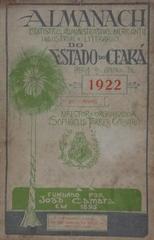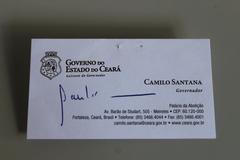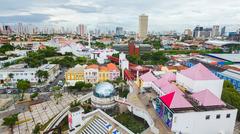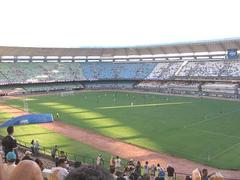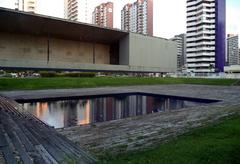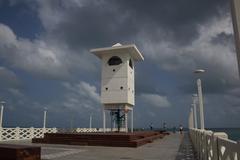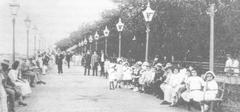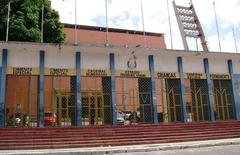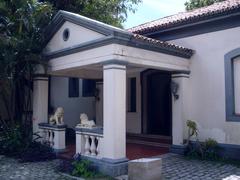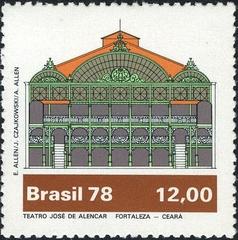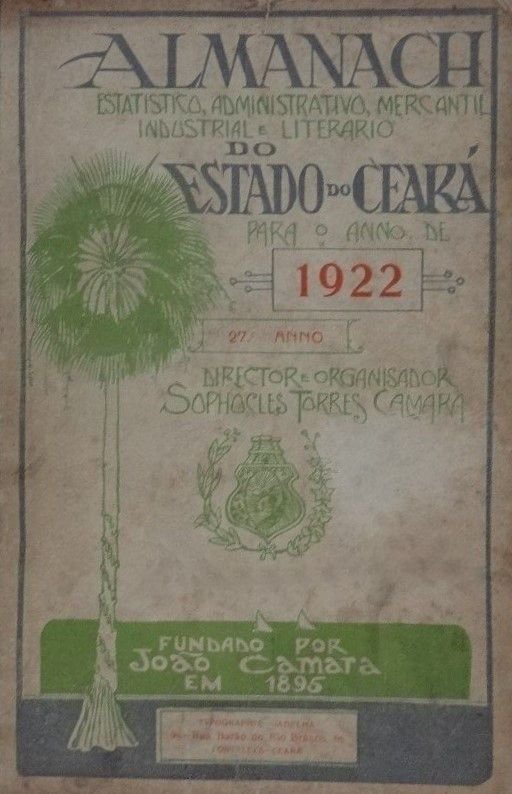
Instituto do Ceará: Visiting Hours, Tickets, and Historical Sites in Fortaleza, Brazil
Date: 15/06/2025
Introduction
Fortaleza, the vibrant capital of Ceará, is renowned for its sun-drenched beaches, dynamic urban life, and rich cultural tapestry. Amidst its modernity and natural beauty lies a profoundly significant institution: the Instituto Do Ceará. For travelers seeking to delve beyond the surface of Fortaleza’s touristic allure, a visit to this institute offers a unique window into the intellectual, historical, and cultural evolution of the region.
History and Foundation
The Instituto do Ceará, officially known as the Instituto do Ceará – Histórico, Geográfico e Antropológico, was founded on August 4, 1887, during the final years of the Brazilian Empire. Its establishment was part of a broader movement across the country to create learned societies dedicated to the study and preservation of regional histories, geographies, and cultures. The institute’s founding members included prominent local intellectuals, politicians, and educators, reflecting the elite’s desire to document and shape the narrative of Ceará’s past and present (Instituto do Ceará Official Website; Wikipedia: Instituto do Ceará).
Throughout the 20th century, the Instituto do Ceará played a crucial role in chronicling Ceará’s transformation from a rural society into a modern urban region. Its archives serve as a repository for rare manuscripts, maps, photographs, and personal papers documenting colonial history, indigenous struggles, abolition of slavery, and influential political movements (History of Ceará).
The Institute’s Role in Regional Identity
The Instituto do Ceará plays a pivotal role in constructing and disseminating the historical memory and identity of Ceará. Its research, publications, and public events have contributed to a nuanced understanding of the region’s social, economic, and cultural transformations. The institute’s work has been instrumental in challenging stereotypes and highlighting the diversity of Ceará’s population, including its indigenous, Afro-Brazilian, and immigrant communities. It preserves documents on pivotal events such as the abolition of slavery in Ceará—the first Brazilian province to abolish slavery in 1884—the cangaço banditry, and messianic movements (History of Ceará).
Architectural and Cultural Heritage
The institute’s headquarters, located in central Fortaleza, is a neoclassical building housing extensive archives, a specialized library, and exhibition spaces. Visitors can explore permanent and temporary exhibitions showcasing rare artifacts, historical maps, and ethnographic collections that connect visitors to Ceará’s past (Instituto do Ceará Official Website). Its proximity to other Fortaleza historical sites, including the Museu do Ceará and the Central Market, makes it a key destination for those exploring Fortaleza’s cultural landscape (Facts.net: Fortaleza).
Visiting the Instituto do Ceará: Hours, Tickets, and Accessibility
Visiting Hours
- Monday to Friday: 8:00 AM to 5:00 PM
- Closed on weekends and public holidays
For special exhibitions and up-to-date schedules, always refer to the official website.
Tickets and Admission
- Admission: Generally free
- Special Exhibitions/Tours: May require a nominal fee or advance registration
Contact the institute or check their website for details regarding tickets and group visits.
Location and Accessibility
- Address: Rua Barão do Rio Branco, 1594, Centro, Fortaleza, CE, 60025-061
- Access: Easily reached by public transport, taxi, or ride-hailing apps. Limited street parking is available; use public or app-based transport during peak hours (Travel Passionate).
- Accessibility: The historic building has some limitations for those with mobility impairments. There are steps at the main entrance and partial adaptation for wheelchairs. Visitors needing assistance should contact the institute in advance.
Contributions to Education and Research
The Instituto do Ceará nurtures historians, geographers, and anthropologists through its extensive library and archives. It collaborates with universities and research centers statewide to support academic projects. The Institute’s publications, including its highly regarded annual journal, cover topics from colonial land systems to folk festivals and religious practices (Academia.edu). The institute also fosters academic collaboration and public engagement through lectures, school programs, and community events.
Guided Tours, Events, and Educational Programs
- Guided Tours: Available for individuals and groups, often led by staff or historians. Advance booking is recommended, especially for non-Portuguese speakers.
- Events: Hosts cultural festivals, book launches, and temporary exhibitions.
- Workshops: Offers educational activities for students and teachers, promoting historical awareness and critical thinking.
Check the official website or social media for the latest schedule.
Exhibitions and Collections
- Permanent Exhibits: Manuscripts, historical maps, photographs, and artifacts from the colonial era to the present.
- Temporary Exhibits: Themed displays (e.g., indigenous cultures, abolition of slavery, urban development).
- Library: Over 30,000 volumes, including rare books and personal archives.
Nearby Historical Sites in Fortaleza
Enhance your cultural itinerary by visiting these nearby attractions:
- Metropolitan Cathedral of Fortaleza: Neo-Gothic landmark (Travel Passionate)
- Museu do Ceará: Complementary exhibits on state history
- Central Market: Local crafts and souvenirs
- Theatro José de Alencar: Historic theater with unique architecture
- Praia de Iracema: Beachfront area with dining and nightlife
Visitor Tips and Frequently Asked Questions
Tips for a Great Visit
- Best Time: Weekday mornings for a quieter experience
- Dress Code: Modest and comfortable attire; some rooms may not be air-conditioned
- Language: Most exhibits are in Portuguese; translation apps or bilingual guides are helpful
- Photography: Allowed in public areas without flash; always ask staff before photographing exhibits
- Safety: The area is safe during the day, but standard urban precautions apply
Frequently Asked Questions (FAQ)
Q: What are the Instituto do Ceará visiting hours? A: Monday to Friday, 8:00 AM–5:00 PM. Closed weekends and holidays.
Q: Is there an entrance fee? A: General admission is free; some special exhibitions or tours may require a small fee.
Q: Are guided tours available in English? A: Primarily offered in Portuguese, but English- or Spanish-speaking guides may be arranged with advance notice.
Q: Is the building accessible? A: There are accessibility limitations; contact the institute ahead for assistance.
Q: Can I take photographs? A: Generally allowed in public areas, but always confirm with staff.
Contact and Further Resources
- Phone: +55 (85) 3252-1541
- Email: [email protected]
- Website: www.institutodoceara.org.br
Stay updated through the institute’s social media and consider downloading the Audiala app for interactive maps, guided tours, and exclusive content about Fortaleza’s historical sites.
Conclusion
The Instituto do Ceará is a cornerstone of Ceará’s cultural and academic life, offering visitors a unique window into the region’s diverse past and present. Its exhibitions, research, and educational programs provide enriching experiences for all audiences. With its strategic location, welcoming staff, and commitment to public memory, the institute is an essential destination for anyone interested in Brazil’s Northeast.
For the latest information on visiting hours, tickets, events, and accessibility, always check the official website or contact the institute directly. Combine your visit with nearby attractions and immerse yourself in the living heritage of Fortaleza.
Download the Audiala app and follow our channels for more tips and updates to make the most of your cultural journey in Ceará.
References
- Instituto do Ceará Official Website, 2024 (https://www.institutodoceara.org.br/)
- Wikipedia: Instituto do Ceará, 2024 (https://pt.wikipedia.org/wiki/Instituto_do_Cear%C3%A1)
- History of Ceará, 2024 (https://en.wikipedia.org/wiki/History_of_Cear%C3%A1)
- Academia.edu: A história trazida à luz: O Instituto do Ceará e as análises acerca dos povos indígenas, 2024 (https://www.academia.edu/14239339/A_hist%C3%B3ria_trazida_%C3%A0_luz_O_Instituto_do_Cear%C3%A1_e_as_an%C3%A1lises_acerca_dos_povos_ind%C3%ADgenas)
- Academia.edu: O Instituto do Ceará e a intelectualidade cearense, 2024 (https://www.academia.edu/44345085/O_Instituto_do_Cear%C3%A1_e_a_intelectualidade_cearense_Identidade_regional_sociabilidade_e_escrita_da_hist%C3%B3ria_da_aboli%C3%A7%C3%A3o_na_prov%C3%ADncia)
- Travel Passionate: Things to do in Fortaleza, Brazil, 2024 (https://travelpassionate.com/things-to-do-in-fortaleza-brazil/)
- Facts.net: Fortaleza, 2024 (https://facts.net/world/cities/46-facts-about-fortaleza/)
